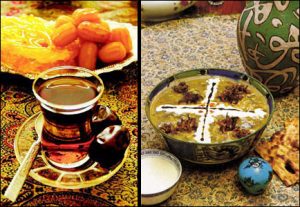Ramadan in Iran, like every other Islamic country, is celebrated at the end of the lunar year. This religious and holy month is a time for believers to start working on themselves to improve themselves morally and physically.
One of the main rituals of Ramadan in Iran is for people to fast from dawn to dusk. Fasting is one of the five columns of every Muslim’s beliefs, during which they deprive themselves of eating and drinking as well as doing any forbidden actions such as lying, stealing, false accusing, cursing and such, aiming to become a better soul by the beginning of the new lunar year.
Despite all the restrictions that you might think people face during this time, Iran during Ramadan experiences one of the liveliest periods of the year. People of Iran during this month hold ceremonial gatherings, cook special Iranian cuisine dishes and Iranian desserts, and have festivals, which you won’t be able to see any other time of the year. So if you want to visit Iran at one of the most unusual times, Iran during Ramadan should be when you want to visit Iran.
So follow this Iran travel guide to learn more about Ramadan in Iran when you visit Iran during this time:
How People Eat During Ramadan in Iran
People of Iran during Ramadan have three meals every day:
Sahari (early breakfast)
The day’s first meal is served early in the morning before the sunrise prayer. This light meal mostly consists of vegetables, fruits, some carbs, or the leftovers from last night’s dinner. Drinking lots of water and vegetables is common, providing bodily fluids. After sunrise prayer time, fasting starts until sunset prayer time.
Iftar (Fast breaker)
You might notice during Ramadan in Iran that the whole city becomes almost empty when the sun sets. This is the

time for breaking the day’s fast. This is a light meal, mostly consisting of hot drinks, fruits such as dates, sweets like Zulbya and Bamye, or desserts like Fereny or Shole Zard. Most of these Iranian desserts and sweets are only available in Iran during Ramadan. So if you are going to Iran this month, try them all.
Sham (Dinner)
Dinner is the largest meal of the day. It is served late at night, and probably some leftovers are saved for the next morning’s Sahari. Ash and Halim are the everyday meals for dinner during Ramadan in Iran.
Manners of Ramadan in Iran
- if you plan to visit Iran during Ramadan, you must know that it is highly disrespectful and unforgettable for anyone to eat, drink, or even chew gum in public. Although according to the laws of Islam, Travelers don’t have to fast, they should not publicly eat or drink.
- All the restaurants, fast foods, cafes, and… in Iran during Ramadan are closed or only serve cold meals behind blinded windows. So, if you want a drink or a meal during this time, you either have to do it at your hotel, look for a restaurant serving cold food, or simply cough-surf! Even if you buy something from a store, such as a water bottle or a sandwich, you are not to consume it publicly.
- On the nights of the 19th, 21st, and 23rd of Ramadan (equal to the 4th, 6th, and 8th of June 2018), all the Shia Muslims around the world and especially in Iran, hold a ceremony to honor the anniversary of Imam Ali, the first Imam out of the 12 holy Imams in Shia beliefs. Shia Muslims believe that the angels of god write everyone’s destiny for the next year during these three nights. So they get together, hold religious ceremonies and ask for forgiveness and stay awake the whole night until morning (Sahar) when their destiny has been written. These ceremonies are only held annually, so if you want to see them, you must visit Iran during Ramadan. Remember that Ramadan in Iran is a month of celebration and happiness, but these three nights are national mourning days, and you must act and dress accordingly.
- Iran during Ramadan is very interesting for those who want to understand Shia beliefs. Aside from that, all the cities are awake until dawn, people go out into the parks, and all the restaurants, movie theaters, and other entertainment centers are served until early morning. If you want to see Iranian nightlife, there’s no better time than Ramadan to visit Iran.




No comment